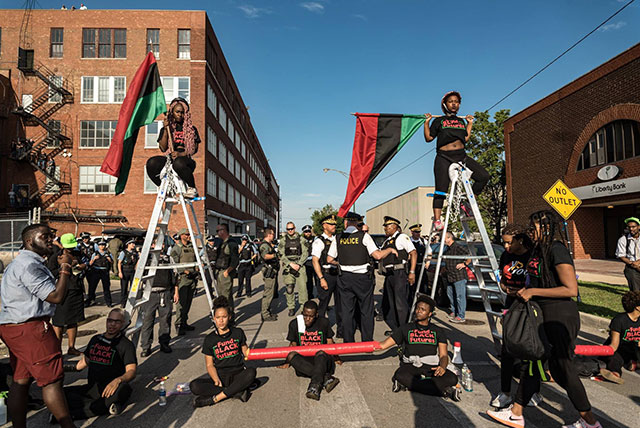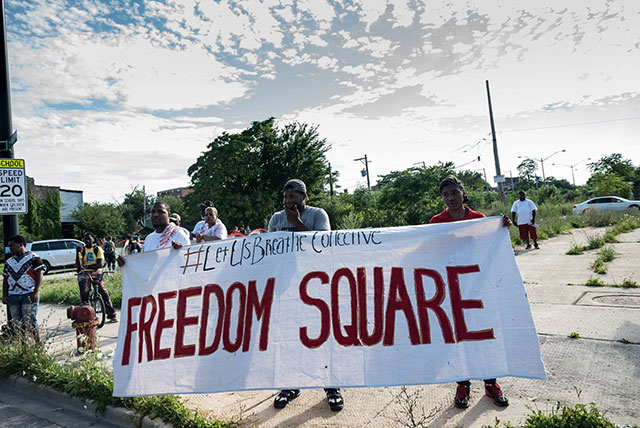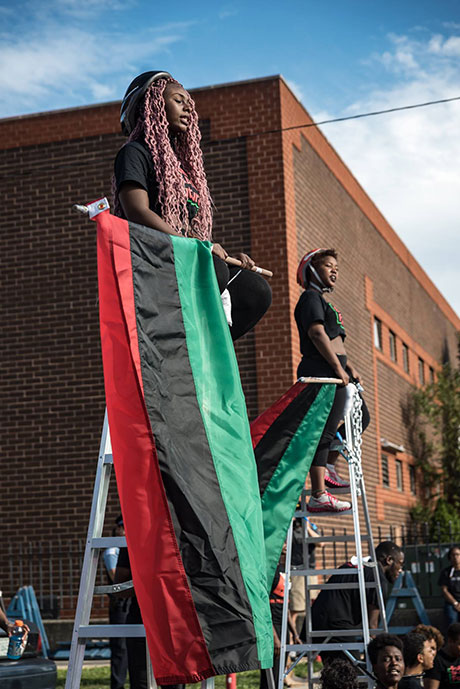
Support justice-driven, accurate and transparent news — make a quick donation to Truthout today!
During a week when political coverage has been dominated by the absurd spectacles of the Republican National Convention (RNC), the movement for Black lives raged on in the streets, with young Black people shutting down and disrupting police facilities in multiple cities on Wednesday. Individual cases of police violence and abuse were highlighted in some cities, while other protests zeroed in on the role of police unions in preventing accountability for police violence.
In New York, protesters with the national organization Black Youth Project 100 (BYP) and the Million Hoodies New York City Chapter formed a human blockade at the Lower Manhattan Headquarters of the Patrolmen’s Benevolent Association to demand the immediate firing of Officer Wayne Issacs, and to call attention to institutions that BYP says hamper police accountability. “The police are trying to manipulate the conversation,” Rahel Mekdim Teka, the New York City organizing chair for Black Youth 100 (BYP), said in a statement. “They are trying to manipulate all of us into believing that they are at risk. They are not at risk. Police officers are the threat.”
In Chicago, BYP and the #LetUsBreathe Collective — a grassroots alliance of artists, journalists and activists — held a march that ended in a blockade, complete with ladders and blockade devices known as lockboxes, which the protesters had to be sawed out of before they could be taken into custody. The Chicago groups were targeting the city’s infamous Homan Square facility, which gained international attention, following highly publicized accusations that prisoners were routinely tortured or “disappeared” into the detention and interrogation warehouse.
Chicago organizers have frequently highlighted the fact that the Chicago Police Department absorbs 38 percent of the city’s annual budget — a whopping $4 million per day — as the city continues to slash jobs and public services.
“This city should not be investing dollars into a police force that has committed racially motivated violence and has had a hand in destabilizing Black communities,” BYP communications co-chair Kirsten Brockenborough said in a statement. “The city spends hundreds of millions of dollars on police while schools and essential services that keep Black communities safe are being cut and closed.”
 Protesters in Chicago said they were creating a “Freedom Square” outside Chicago’s infamous Homan Square police facility. (Photo: Sarah-Ji)
Protesters in Chicago said they were creating a “Freedom Square” outside Chicago’s infamous Homan Square police facility. (Photo: Sarah-Ji)
The State of Illinois, in general, has consistently garnered headlines for a state budget battle that has held funding for social services hostage while allowing Chicago’s Cook County Jail to function as the largest mental health care provider in the country.
 Two protesters sat atop ladders, chained in place as BYP 100 and the #LetUsBreathe collective formed a blockade at Chicago’s infamous Homan Square facility. (Photo: Sarah-Ji)Chicago organizers announced the march that preceded their local blockade as a commemoration of the 50th anniversary of Dr. Martin Luther King Jr.’s Chicago Freedom Summer. The event included music and poetry performances, in an effort to symbolically reclaim the area, which the groups referred to as “Freedom Square.”
Two protesters sat atop ladders, chained in place as BYP 100 and the #LetUsBreathe collective formed a blockade at Chicago’s infamous Homan Square facility. (Photo: Sarah-Ji)Chicago organizers announced the march that preceded their local blockade as a commemoration of the 50th anniversary of Dr. Martin Luther King Jr.’s Chicago Freedom Summer. The event included music and poetry performances, in an effort to symbolically reclaim the area, which the groups referred to as “Freedom Square.”
In Detroit, protesters chained themselves to a police station to mark what would have been the 14th birthday of Aiyana Stanley-Jones, who was shot dead at the age of seven during a SWAT team raid at her home. After two mistrials, the officer who killed Stanley-Jones was eventually allowed to return to work — a turn of events that many view as both a miscarriage of justice and an insult to the community.
Protests also occurred in Washington, DC and the Bay Area, as BYP’s day of action provided an alternative focus in a media landscape currently dominated by coverage of the RNC. The Republican convergence has also drawn numerous protests, but has generally followed a predictable script (even though, as Melania Trump demonstrated, part of that script may have been borrowed).
While the media’s framing of the movement for Black lives may have shifted after the July 7 shooting of seven police officers in Dallas — five of whom were killed — activists say that the actions of one man do not change the realities that Black people face in communities across the country, nor do they reflect the movement that has arisen to oppose those conditions.
“Police do not keep us safe. Police do not protect us,” Rahel Mekdim Teka said. “They are the danger that keeps Black people unsafe. We must divest from institutions that do not value us and instead invest in Black communities.”
Press freedom is under attack
As Trump cracks down on political speech, independent media is increasingly necessary.
Truthout produces reporting you won’t see in the mainstream: journalism from the frontlines of global conflict, interviews with grassroots movement leaders, high-quality legal analysis and more.
Our work is possible thanks to reader support. Help Truthout catalyze change and social justice — make a tax-deductible monthly or one-time donation today.